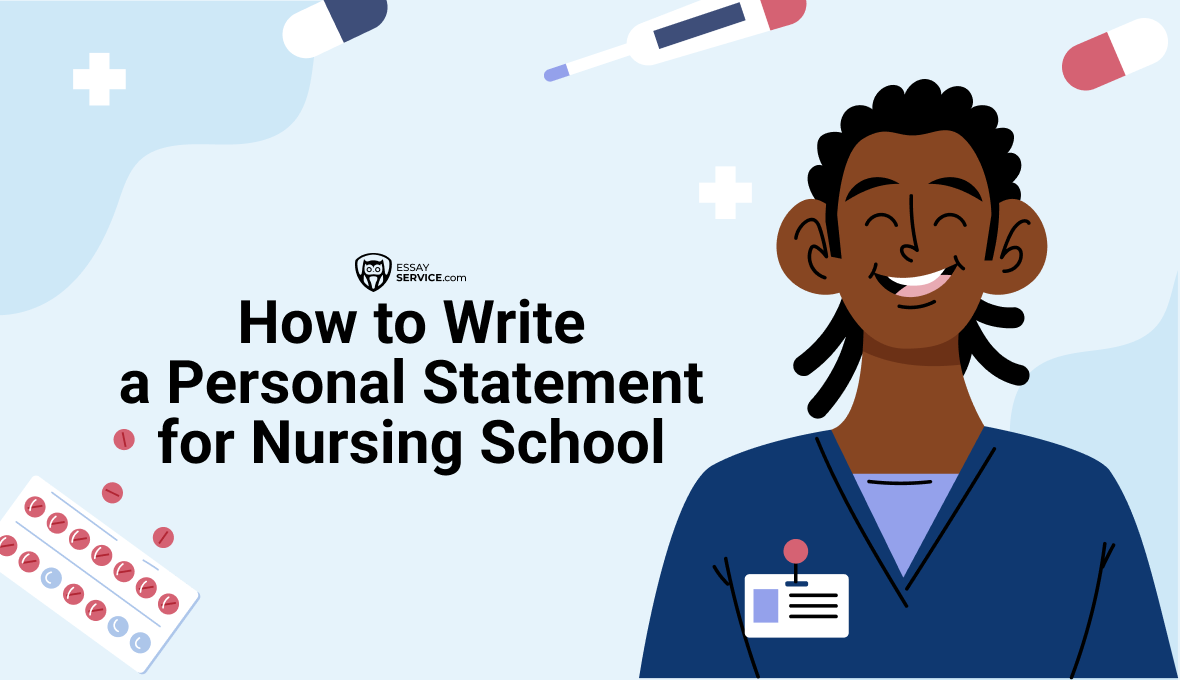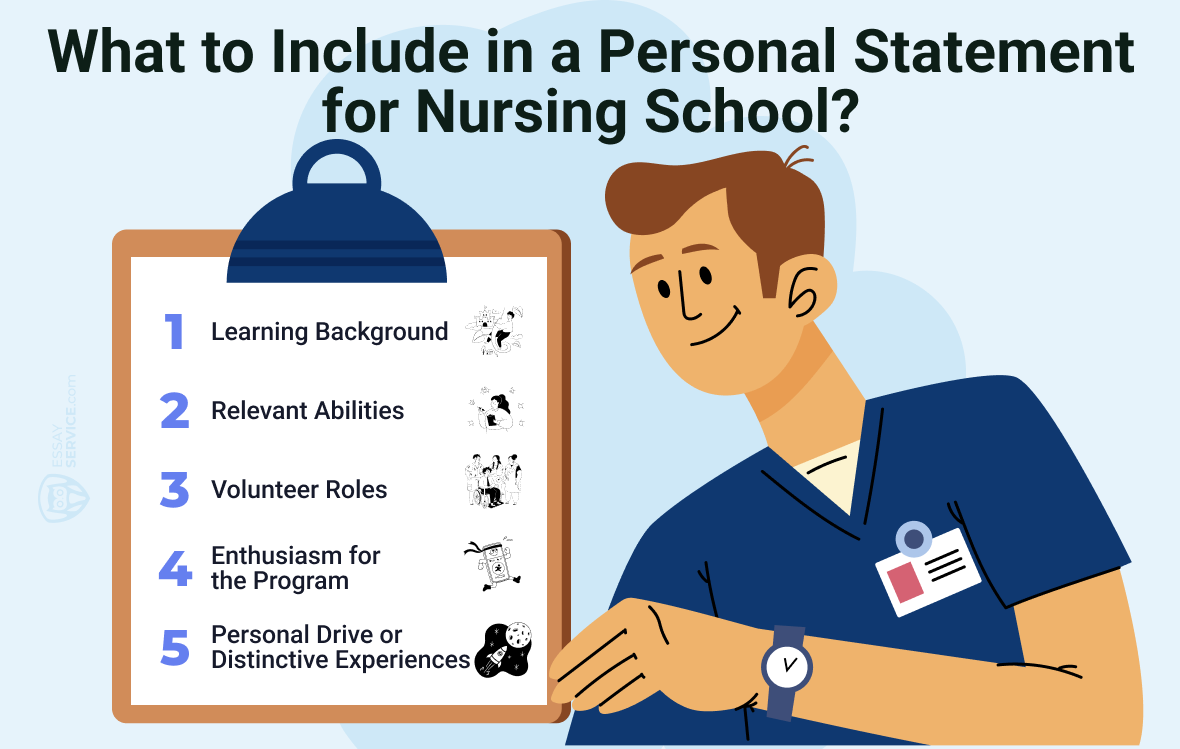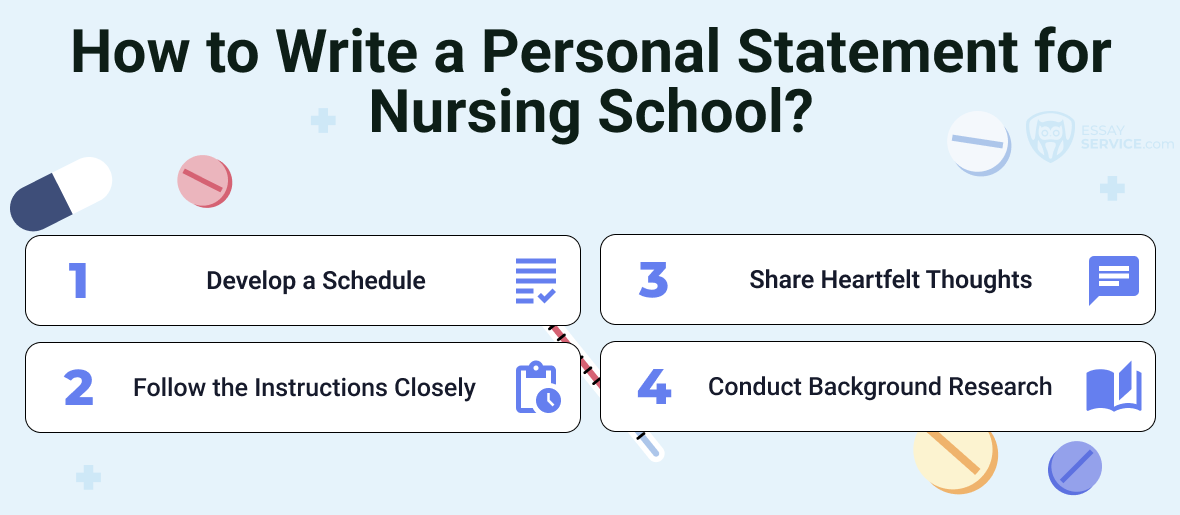
How to Write a Personal Statement for Nursing School: Tips & Example
Are you prepared to start living your goal of becoming a nurse? Then, you most likely need to work on your nursing school personal statements, which is how you found yourself here.
If you've never written one before, creating a personal essay for nursing school may seem a little intimidating. How do you capture your passion for caregiving in just a few words? How do you stand out among countless other applicants vying for a spot in your desired program?
Don't worry, though, since we'll walk through this together and discuss how to write a personal statement for nursing school with its key components. You'll be well on your way to expressing your reasons for applying, highlighting your advantages, and making an impact on admissions committees once you've finished reading.
What Is a Nursing School Personal Statement?
A personal statement for nursing school is a brief essay, usually about one page, where you share your background, experiences, and aspirations in nursing. This statement helps admissions officers understand who you are beyond your grades and test scores. Keep in mind that every institution may have different requirements, so it's critical to find out what they want in your statement. Why you think you'd be a great match for their program and why you enjoy nursing are common subjects to discuss.

What to Include in a Personal Statement for Nursing School?
As already mentioned, the specifics of what schools want in nursing school personal statements can vary from one program or university to another. While some may ask about your interest in a particular nursing specialty, such as pediatrics or oncology, others might inquire about your motivations for pursuing a nursing career. In general, nursing admissions teams are interested in learning about your personal connection to the field of nursing and your relevant experiences.
Usually, candidates who have completed their bachelor program are strongly preferred by employers. A recent poll by AACN on the Employment of New Nurse Graduates revealed that 72% of employers highly prefer nurses with baccalaureate preparation, while roughly 28% of businesses demand new recruits to have one. That's why mastering essay writing skills is essential. Here are some common topics for nursing school personal statements.

Learning Background
Begin by detailing:
- Academic achievements
- Relevant coursework
Describe the course of your studies, emphasizing the moments that helped you realize your dream of becoming a nurse. Perhaps you could reflect on the rigorous science courses you completed in high school or the healthcare-related electives you took during your undergraduate studies.
Relevant Abilities
Shift the narrative to highlight the practical skills you've cultivated, which are integral to nursing practice, such as:
- Communication
- Empathy
- Attention to detail
Share anecdotes that illustrate your proficiency in communication, empathy, and attention to detail. For example, you might recount how your part-time job as a lifeguard taught you to remain composed under pressure and effectively communicate with both colleagues and those in need of assistance.
Volunteer Roles
Transition to discussing your volunteer experiences, particularly those that have provided insight into the world of healthcare. Recall the roles you undertook and the impact they had on your understanding of patient care. Perhaps you could describe the meaningful interactions you had while volunteering at a local hospital, where you gained firsthand exposure to healthcare professionals and witnessed the importance of compassionate caregiving.
Enthusiasm for the Program
Articulate your enthusiasm for the nursing program you're applying to by highlighting its unique attributes. Delve into aspects of the curriculum, faculty expertise, or clinical opportunities that resonate with your career goals. For instance, you might express your eagerness to participate in the program's community health initiatives or emphasize your desire to gain hands-on experience in diverse clinical settings.
Personal Drive or Distinctive Experiences
Conclude by sharing personal anecdotes or challenges that have fueled your passion for nursing. Offer a glimpse into the pivotal moments that have shaped your journey and solidified your commitment to the profession. Perhaps you could recount how caring for a family member with a chronic illness ignited your desire to make a difference in the lives of others, underscoring the profound impact of empathy and resilience in your decision to pursue nursing.
How to Write a Personal Statement for Nursing School?
Below, our personal statement writing service offers a handful of straightforward tips to simplify writing a nursing school personal statement. By incorporating these practical pointers, you'll find yourself well-equipped to create an outstanding nursing school essay that authentically reflects your unique qualities and aspirations.

Develop a Schedule
When writing a nursing school personal statement, create a timeline that outlines each step of the writing process, from brainstorming ideas to final revisions. Be sure to include specific deadlines for each stage to stay on track and avoid last-minute rushes.
Break down the tasks into smaller, manageable chunks, allocating time for researching, drafting, seeking feedback, and polishing your statement. By following a structured timeline, you'll ensure a more organized and effective approach to crafting your personal statement. Using these tips will make your essays for your nursing school application stand out without sacrificing authenticity and sincerity.
Follow the Instructions Closely
Review the nursing school's instructions thoroughly and make note of any specific prompts or requirements they provide. Pay attention to word limits, formatting guidelines, and any additional materials they request, ensuring your personal statement aligns perfectly with their expectations.
Consider creating an outline or checklist based on the guidelines to ensure you cover all necessary aspects in your statement. Double-check your work before submission to confirm compliance with the provided instructions, as overlooking even minor details could negatively impact your application.
Share Heartfelt Thoughts
Don't hold back when sharing your personal experiences, passions, and aspirations in your nursing personal statement. Be authentic and heartfelt in your writing, allowing your genuine enthusiasm for nursing to shine through and resonate with the admissions committee.
Share specific anecdotes or moments that have shaped your desire to pursue a career in nursing, illustrating the depth of your commitment and dedication. Avoid clichés or generic statements and instead focus on conveying your unique perspective and motivations, which will leave a lasting impression on the reader.
Conduct Background Research
Take the time to research the particular nursing program and school you're applying to, delving into their curriculum, faculty, and unique offerings. As a nursing student, consider how your own values and goals align with those of the institution, and tailor your nursing personal statement to demonstrate your genuine interest and fit within their community.
Additionally, research any specific criteria or qualities they look for in applicants, allowing you to address these effectively in your statement. Personalize your statement by incorporating references to the school's mission, values, or programs, showcasing your knowledge and enthusiasm for becoming part of their academic community.
Template for a Nursing School Personal Statement
The main component of your application to nursing school is your personal statement, which gives you the chance to share your experiences, passions, and reasons for wanting to become a nurse. To guide you through the process, here's a template for a nursing school personal statement.
Introduction
Your personal statement should start with an attention-grabbing introduction that draws the reader in. Think about sharing a personal story, a thought-provoking quotation, or a succinct analysis of what motivated you to become a nurse. In addition to creating a deep connection with the reader, this part should set the tone for the rest of your statement.
Motivation and Passion
Share your sincere excitement about nursing and explain your attraction to the field. Consider the personal experiences that shaped your desire to become a nurse, such as volunteer work, opportunities for shadowing, or interactions with other people. Emphasize the particular instances that sparked your desire to serve people and your dedication to have a good influence in the healthcare industry.
Academic and Professional Goals
Describe your goals for your education and career in the nursing area. Talk about your reasons for choosing the specific nursing school you are applying to and how it fits with your professional objectives. Provide any pertinent extracurricular, professional, or academic experiences that show your commitment to nursing school advancement and your preparedness for the program.
Strengths and Qualifications
Emphasize the special abilities, credentials, and traits that set you apart from the competition for nursing school admission. These could include traits like empathy, effective communication, the capacity to solve problems, or the capacity to be resilient in trying circumstances. Give concrete instances of how these abilities have helped you improve academically and personally, as well as how they will be beneficial to you in the future as a nurse.
Diversity and Inclusivity
Recognize the value of inclusivity and diversity in the nursing profession. Describe how your upbringing, life experiences, and viewpoints enrich the nursing profession and improve your capacity to offer culturally sensitive care to a range of patient populations. Stress your desire to speak up for marginalized communities and your dedication to advancing inclusion and equity in healthcare.
Conclusion
Your personal statement should have a strong ending that captures the reader's attention and reaffirms your love for nursing. Give a brief summary of the main ideas you've covered and express your excitement for starting this fulfilling adventure. Convey your excitement about the possibility of improving the lives of others and your thanks for the chance to pursue a career in nursing.
Nursing School Personal Statement Example
Now that you know how to write a personal statement for a nursing application, let's look at a real-world example that combines professional goals, academic accomplishments, and personal experiences to create a gripping story that highlights the applicant's love for the field. You are welcome to modify these nursing school examples to suit your own goals and experiences!
*Important note: Please do not submit an application using our samples. These nursing personal statement examples are intended to be used as a model for creating your own unique story.
Frequently asked questions
Do All Nursing Schools Require A Personal Statement?
Not all nursing schools necessitate a personal statement, but many do. It serves as a means for you to express your passion for nursing and showcase your unique qualities that make you a good fit for the program. While some schools may prioritize standardized test scores and GPA, a well-crafted personal statement can make you stand out and give the admissions committee a deeper understanding of who you are beyond your academic achievements.
When to Write a Personal Statement for Nursing School?
It's best to write your personal statement for nursing school when you have a clear understanding of your motivations, experiences, and career goals in nursing. This might be during your final year of high school if you're applying to undergraduate programs or when you've gained some relevant experience if you're applying to graduate programs. Take the time to reflect on why you want to pursue nursing, any relevant experiences you've had, and how those experiences have shaped your desire to become a nurse.
How Long Should A Nursing School Personal Statement Be?
Your personal statement nursing school should be concise yet impactful, typically ranging from 500 to 800 words. Admissions committees review numerous applications, so it's essential to convey your message effectively without overwhelming the reader with excessive length. Aim to include relevant experiences, motivations, and aspirations while maintaining clarity and coherence in your writing. A well-edited statement that captures your essence and demonstrates your commitment to nursing will leave a lasting impression on the admissions committee.
Nursing Workforce fact sheet. (n.d.). https://www.aacnnursing.org/news-data/fact-sheets/nursing-workforce-fact-sheet
New posts to your inbox!
Your submission has been received!



.webp)
